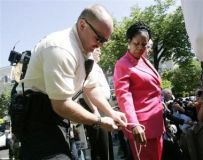Public pressure mounts on US to act on Darfur
April 28, 2006 (WASHINGTON) — Public pressure is growing on the Bush administration to work harder to stop atrocities in Sudan’s Darfur region, even as options narrow over how to tackle what the United States labels genocide.
 In the build-up to “Save Darfur” rallies across the United States this Sunday, five U.S. lawmakers were arrested in the capital on Friday for protesting outside Sudan’s Embassy.
In the build-up to “Save Darfur” rallies across the United States this Sunday, five U.S. lawmakers were arrested in the capital on Friday for protesting outside Sudan’s Embassy.
U.S. President George W. Bush endorsed this weekend’s rallies and met Darfur advocacy groups organizing the demonstrations, which will draw Hollywood’s elite, musicians, religious leaders and politicians from all sides.
“They agree with thousands of our citizens — hundreds of thousands of our citizens — that genocide in Sudan is unacceptable,” said Bush after meeting rally organizers.
“I want the Sudanese government to understand the United States of America is serious about solving this problem,” he said.
The rallies are organized by a coalition of more than 160 religious and humanitarian groups. They coincide with a Sunday deadline for the warring factions in Darfur to reach agreement at peace talks dragging on in Abuja, Nigeria.
Political analysts are pessimistic there will be a deal by the deadline set by the African Union, which has about 7,000 struggling troops in Darfur that the United States would like to augment with U.N. peacekeepers.
Sudan’s government has said it will accept U.N. peacekeepers only if there is a deal in Abuja. If the talks fail, political analysts caution there will be even fewer options over how to handle Darfur.
“The options on Darfur are definitely running out,” said Africa expert Princeton Lyman of the Council on Foreign Relations, a former U.S. ambassador to South Africa.
Sudan is accused by U.N. and U.S. officials of arming militias, who have raped, pillaged, and killed tens of thousands, and driven some 2 million villagers into camps. Sudan has denied the charge and says there is no genocide.
State Department deputy spokesman Adam Ereli told Reuters he was still hopeful of a deal in Abuja. “We have a fighting chance, folks are at the table and working hard,” he said.
The Bush administration says it has taken the international lead on Sudan, but many experts say it has not been tough enough on Khartoum or in enlisting other major powers such as Russia or China.
Bush announced new sanctions on Thursday against people suspected of aiding genocide in Darfur.
A Zogby International poll of U.S. voters last month showed that 70 percent would support a U.S.-backed no-fly zone in Sudan, to prevent aerial attacks on civilians, and 59 percent believed more could be done diplomatically.
Sudan expert John Prendergast said Washington needed to push Sudan’s government harder to accept a U.N.-led force for Darfur, and he predicted Sunday’s rallies would have “a decisive impact” in pressuring Bush to take a stronger line.
“There is a growing network of citizen groups which is trying to get change. We will see in the next few weeks who wins this battle,” he said.
Lyman said the Bush administration should push the African Union to do more.
“The African Union has to be confronted and told that it is not toeing the line,” Lyman said. “Khartoum is not feeling any pressure at the moment. None.”
The Darfur conflict has attracted activists from all sides of the political and religious spectrum — from Jewish leaders such as Nobel Prize winner Elie Wiesel to evangelicals and liberals and conservatives alike.
Darfur has also become a major rallying cry on campus. The University of California in March voted to pull out of funds that invest in nine firms doing business in Sudan.
MTV’s college network is participating in Sunday’s Washington rally and introducing a video game on Darfur. “Our campaign is powered by college students who are not about to let the first genocide of the 21st century happen on their watch,” said network representative Ross Martin.
(Reuters)
